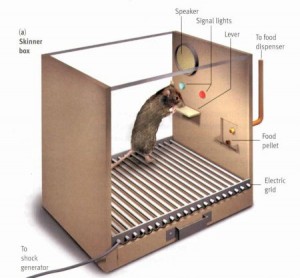One of the talks I like to give is called Human Nature 101. It discusses a number of classic studies in psychology and relates them to day to day experiences. The talk used to be called Simple and Profound. I called it that because simple principles can often have a profound affect on us. We have a tendency to look for overly complex explanations for human behaviour. In fact, there are often some very simple principles underlying this apparent complexity.
One of these principles was clearly demonstrated when lab rats were placed in Skinner boxes. As you can see below, a Skinner box is a simple apparatus where a rat presses a bar to get a pellet of food. The interesting thing about experiments with Skinner boxes is that we can see what happens when we reward the rats in different ways. As I describe in my column below, when rats are rewarded randomly their behaviour is much more resistant to change.
Why is this so profound? Because it affects all of our habits in surprising ways. The best example of this is seen in casinos. Slot machines work exactly as Skinner boxes do. If we win once in a while we will keep putting our coins in the machine. Getting rewarded randomly makes bad habits very difficult to break.
This also has implications for prejudices and attributional biases. The fact that a stereotype is sometimes confirmed by an observation makes it much harder to think differently about something. Let’s suppose a bigot believes all Jews are swindlers or all Blacks are thieves. If a news report shows a convenience store being robbed by a black youth, or a Jewish man arrested for a white collar crime, the bigot will feel justified in his belief. It is a rewarding feeling that solidifies the thinking pattern (of course we can consider thinking patterns to be habits too).
I am also reminded of this principle when I drive in Montreal traffic. Sometimes there are traffic reports warning of congestion. When these reports are accurate, it is wise to take an alternate route. But sometimes the detour is long. In the past, I have sometimes taken a chance of staying on my original route in hopes the reports were exaggerated. And of course once in a while I sail through. Unfortunately, that is the trap! I get rewarded when traffic reports are wrong and I have avoided a long detour. Of course, sometimes the traffic reports are bang on and I get screwed.
The rational person in me knows it is probably best to bite the bullet and always take the detour. But when I am in a hurry, the fact I sometimes got lucky in the past pulls on me like the bar in the Skinner box. Maybe this time the reports are exaggerated, please, please, please! Doh! Wrong again.
Would you like a scratch card with that?
(Source: Un gratteux avec ça? Journal Métro, November 30, 2010)
Hmm, let’s examine a question that I’m sure keeps most of us up at night: Are human beings smarter than lab rats?
If you put a lab rat in a cage with a bar and gave it a pellet of food every time it pressed the bar, the rat would quickly learn the connection. It would happily press the bar whenever it was hungry. If you stopped giving it a pellet, it wouldn’t take the rat very long to learn that pressing the bar wasn’t working anymore. It would soon ignore the bar.
Now let’s suppose that instead of giving the rat food every time it pressed the bar, you only fed it every once in a while. Sometimes the bar would have to be pressed only once or twice before food came out, other times it might take ten or twenty presses. Now what would happen if you stopped giving out pellets completely? These rats would keep pressing the bar for an extraordinarily long time before giving up. This is what happens when we reward rats randomly. Their behaviour is much more resistant to change.
Now let’s examine human beings and how rewards affect us. Did you ever wonder why those who run lotteries give out small prizes like $10? People play lotteries to become millionaires. Private jets and beachfront property don’t come cheap. Ten bucks ain’t gonna do it, folks!
These small prizes serve one purpose only. They are the occasional pellets of food that keep us pressing the bar. People who run lotteries or program slot machines know that without the occasional small reward, the big prizes would happen too rarely for people to persist in their efforts to win them.
Of course this principle extends far beyond lotteries and casinos. Any habit that occasionally rewards us will be much harder to break than one that never does. This even applies to the sleazebag at the bar. If a pick-up line works once in a blue moon, he isn’t going to stop using it.
So then, what is the difference between a lab rat and a human? One would think that we humans, with our highly developed reasoning skills, are far too smart to be taken in by these simple manipulations or occasional successes. Our advanced brains should help us learn well from our mistakes and break bad habits, shouldn’t they? Sadly, we are not so different from rats.
Like all animals, our emotional connection to things that reward us from time to time will often prevent us from giving up on things that don’t work very well or stopped working altogether.
Tagged as attributional bias, gambling, prejudice, Skinner box, variable schedules of reinforcement.
Posted in Anger and conflict, Human nature.
Posted on 13 Dec 2010

